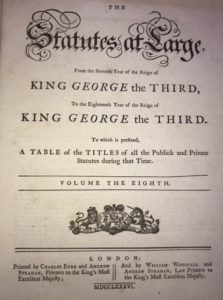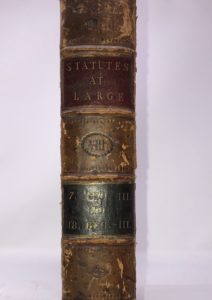The Massachusetts Government Act
[14 Geo 3 c 45, May 20, 1774]
“An Act for the Better Regulating the Government of the Province of the Massachusetts Bay, in New England”
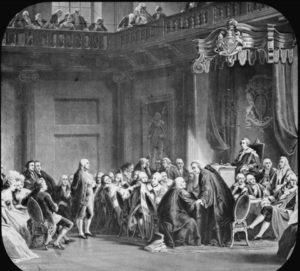 The Massachusetts Government Act was a deliberate effort by England to reign in and punish Massachusetts for the Boston Tea Party and other acts of colonial resistance. The harsh Act revoked Massachusetts’ Charter of 1691, which had permitted a high degree of local autonomy and self-rule. In its place, the Act attempted to impose royal control by severely restricting the ability to hold town meetings without the consent of the royal governor. The Act replaced elected town officials and judges with more pliant royal appointees.
The Massachusetts Government Act was a deliberate effort by England to reign in and punish Massachusetts for the Boston Tea Party and other acts of colonial resistance. The harsh Act revoked Massachusetts’ Charter of 1691, which had permitted a high degree of local autonomy and self-rule. In its place, the Act attempted to impose royal control by severely restricting the ability to hold town meetings without the consent of the royal governor. The Act replaced elected town officials and judges with more pliant royal appointees.
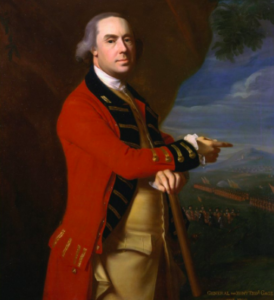 In an effort to intimidate Boston, King George appointed General Thomas Gage, the commander of the British army in North America, as the military governor of Massachusetts. According to General Gage, “America is a mere bully, from one end to the other, and the Bostonians by far the greatest bullies.” Yet, by appointing General Gage, Parliament sent the message that England was willing to impose martial law, replacing democratic rule with military might if necessary to restore order.
In an effort to intimidate Boston, King George appointed General Thomas Gage, the commander of the British army in North America, as the military governor of Massachusetts. According to General Gage, “America is a mere bully, from one end to the other, and the Bostonians by far the greatest bullies.” Yet, by appointing General Gage, Parliament sent the message that England was willing to impose martial law, replacing democratic rule with military might if necessary to restore order.
Background: Massachusetts Bay Colony was unique among the thirteen colonies and proudly independent from the time it was founded. Unlike other colonial charters, the Massachusetts Charter permitted self-government through a 28 member Council of Inhabitants/Provincial Assembly, which was elected annually. This right to democratic representation was taken seriously in Massachusetts, where residents resented corruption by royally appointed officials.
The Act revoked democratic rule in Massachusetts which was restored to the King and consolidated under the royal governor, who was granted the sole power to appoint and dismiss the Provincial Assembly. Moreover, positions which had been selected by local election would now be appointed by the royal governor.
According to Lord North, the purpose of the act was “to take the executive power from the hands of the democratic part of government.” For Lord North Massachusetts represented a focal point of resistance to royal control. Lord North called on Parliament to adopt the Act on the ground that the whole colony was “in a distempered state of disturbance and opposition to the laws of the mother country.”
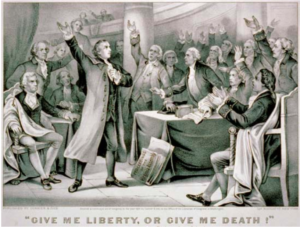 Result: When royal Governor Thomas Gage dissolved the Provincial Assembly in October 1774, Massachusetts responded by setting up a shadow, competing government outside of Boston. Invoking Enlightenment political philosophy, colonial leaders argued that by abrogating the Charter of 1691, the Massachusetts Government Act had nullified the underlying contract between the king and the people.
Result: When royal Governor Thomas Gage dissolved the Provincial Assembly in October 1774, Massachusetts responded by setting up a shadow, competing government outside of Boston. Invoking Enlightenment political philosophy, colonial leaders argued that by abrogating the Charter of 1691, the Massachusetts Government Act had nullified the underlying contract between the king and the people.
Rebel leaders ignored Governor Gage’s order for new elections. The Massachusetts Provincial Congress was established in Concord and acted as a parallel government from 1776 until the adoption of the Massachusetts Constitution in 1780. Notwithstanding its provisional nature, the Provincial Congress ultimately was treated by colonists as the legitimate government for all of Massachusetts, except in the areas around Boston that were still under British control.
Six of the twenty-seven reasons cited in the Declaration of Independence related to the Coercive Acts/Intolerable Acts of 1774.
Click here for a discussion of the Boston Port Act.
Click here for a discussion of the Administration of Justice Act.
Click for for a discussion of the Quartering Act.
Click here for a discussion of the Quebec Act.
Click here for the text of the Massachusetts Government Act:
Click here for a scan of the Act, printed in Danby Pickering’s Statutes at Large, Vol XXX at p. 381:
